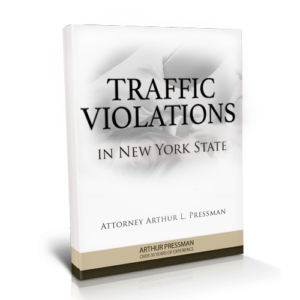 Your Ticket to Justice
Your Ticket to Justice
The New York State Traffic Violations Guide was created to help people who were given traffic tickets while driving or parked in a motor vehicle.
When you are issued a traffic ticket by a police officer, your first instinct may be to mail it in and plead guilty. However, this costs points on your license, time, and money.
Traffic penalties cost more these days than just the cost of the ticket. Per a recent analysis by insurance.com, a reckless driving charge boosts insurance premiums by 22 percent on average, for example, while driving without a license adds 18 percent. And higher rates can stay in place for as many as seven years. The average premium increase due to a reckless driving charge is $550 per year. Potential costs over seven years can equal $3,850. This alone should give you reason to fight a traffic penalty charge before just paying it.
In the state of New York, you could be charged with the following traffic violations:
- Speeding
- Overdue parking meter
- Not using a turn signal
- Parking in a handicapped zone without authorization
- Making obscene gestures and over-aggressive driving
- Improper stopping at a stop sign
- Improper yielding to a yellow light
- Cutting off another vehicle
Points on Your License Cause Insurance Rates to Rise
A moving violation, such as a speeding ticket or leaving the scene of a property damage accident, can carry serious penalties. In addition to the fine, your insurance may increase due to points being added to your license. Your driver license could even be suspended or revoked if you exceed 11 points or are convicted of three speeding violations in 18 months.
This table lists the number of points given for specific traffic violations:
| Violation | Points |
| Speeding (mph over speed limit): | |
| 1 – 10 mph | 3 |
| 11 – 20 mph | 4 |
| 21 – 30 mph | 6 |
| 31 – 40 mph | 8 |
| More than 40 mph | 11 |
| Speeding (mph over speed limit not indicated) | 3 |
| Reckless driving | 5 |
| Failing to stop for a school bus | 5 |
| Inadequate brakes | 4 |
| Following too closely | 4 |
| Passing improperly, changing lanes unsafely, driving to the left of center, driving in the wrong direction | 3 |
| Failing to obey a traffic signal, a stop sign, or a yield sign | 3 |
| Railroad crossing violation | 3 |
| Failing to yield the right-of-way | 3 |
| Passenger safety violation, including seat belt and child safety seat violations for passengers under the age of 16 | 3 |
| Leaving the scene of an accident that includes property damage or the injury of a domestic animal | 3 |
| Other moving violations | 2 |
| Inadequate brakes (vehicle of an employer) | 2 |
Will Hiring an Attorney Save Me Money on a Traffic Ticket?
The answer is yes. An attorney can negotiate a reduced plea on a traffic matter which will save them fine money. Secondly, an attorney can, in most cases, arrange that you do not have to appear at a driving school. This will save you money, as well. Thirdly, when an attorney negotiates a plea to reduction in charges, it will save you money on your insurance, and fourthly it will save you the inconvenience of spending two or three hours in court. For most people, time is money.
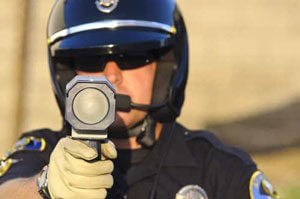 Speeding
Speeding
Speeding is a traffic offense in New York. A speeding ticket is costly and can cause your insurance premiums to go up based on the accumulation of points on your license. In addition, if your insurance company considers you high risk because of excessive tickets, your insurance is dropped completely. Getting a ticket doesn’t mean you’re guilty of speeding.
Means of determining speeding in NY
A variety of different methods and forms of technology are used to measure the speed of a vehicle. Some of the most common methods of determining the charge are with the following devices:
- Lasers: A laser is aimed at the targeted vehicle and the time/distance is measured. Lasers can pinpoint specific vehicles in congested traffic.
- Radar guns: Radar guns aim an electromagnetic signal to determine the speed of a vehicle. An officer who uses the radar device has to be certain it is not picking up objects that may be in the targeted zone and cause interference.
- Clock and pace method: An officer moves his vehicle behind another vehicle, keeping a uniform pace between the two vehicles for a certain time using the speedometer to measure the overall speed.
- Speed cameras: In New York, a speed radar camera is used to trigger a camera to photograph vehicles traveling faster than a set speed. This type of device also captures the specific time, location, and speed.
- Aerial speed devices: Police in New York measure vehicle speeds by aircraft by monitoring the time it takes the target to travel between two marked spots. They then signal to ground officers who issue the speeding violation.
NY speeding tickets can be costly
The following tables list the schedule for speeding fines and points on your license if you are convicted of speeding in New York:
| New York Vehicle and Traffic Law Violation | Maximum Fine | Court Surcharge |
| 1180 (a) Speed not reasonable and prudent | 150 | $80-$85 |
| 1180 (b) Speed over state limit | ||
| >10 miles per hour (mph) over limit | 150 | $80-$85 |
| 11-30 mph over limit | 300 | $80-$85 |
| <31 mph over limit | 600 | $80-$85 |
| 1180 (c) Speeding in school zone (between 6:00 p.m. and 7:00 a.m. and non-school days) | ||
| >10 mph over limit | 150 | $80-$85 |
| 11-30 mph over limit | 300 | $80-$85 |
| <31 mph over limit | 600 | $80-$85 |
| 1180 (c) Speeding in school zone on school days | ||
| >10 mph over limit | 300 | $80-$85 |
| 11-30 mph over limit | 600 | $80-$85 |
| <31 mph over limit | 1200 | $80-$85 |
| 1180 (d) Speeding in zone | ||
| >10 mph over limit | 150 | $80-$85 |
| 11-30 mph over limit | 300 | $80-$85 |
| <31 mph over limit | 600 | $80-$85 |
| 1180 (d) Speeding on a restricted highway | ||
| >10 mph over limit | 150 | $80-$85 |
| 11-30 mph over limit | 300 | $80-$85 |
| <31 mph over limit | 600 | $80-$85 |
| 1180 (c) Failure to reduce speed for vehicles with special hazards | 150 | $80-$85 |
| 1180 (f) Speeding in a construction zone | ||
| >10 mph over limit | 150 | $80-$85 |
| 11-30 mph over limit | 300 | $80-$85 |
| <31 mph over limit | 600 | $80-$85 |
| 1180 (g) Vehicles greater than 18,000 lbs speeding detected using radar | ||
| >10 mph over limit | 150 | $80-$85 |
| 11-30 mph over limit | 300 | $80-$85 |
| <31 mph over limit | 600 | $80-$85 |
| 1181 (a) Driving too slow impeding traffic | 150 | $80-$85 |
| 1181 (b) Driving below minimum posted speed limit | 150 | $80-$85 |
| 1182 (1) Unauthorized speed contest (racing) | 525 | $80-$85 |
How do the Police Measure Speed?
If you’ve been ticketed for speeding in New York State, you’ve probably researched the fine, the penalty points and the requirements for traffic school and concluded that breaking the speed limit “just isn’t worth it!” Although you don’t get to “do it all over again,” you can help yourself immensely by hiring an attorney who has experience challenging the State Police in their use of radar and lidar.
New York State Troopers use two devices to measure vehicle speed: Stalker DSR units and LTI Ultralyte LR B devices. These are precise instruments, which require very little on the part of an operator to get an accurate reading. However, they are not perfect and, if you know what you’re doing, it is possible to challenge this evidence in court and get a dismissal of the ticket or a reduction in the charge.
Stalker Directional Sensing Radar employs a ground-breaking technology that allows the radar unit to detect the speed of an approaching or withdrawing object while the unit is stationary or moving. The trooper can use the unit while parked on the roadside or in pursuit, without having to adjust the unit. A trooper monitoring approaching traffic need not worry that the device will pick up readings from traffic going the opposite direction.
The LTI Ultralyte LR B is a pinpoint laser device that works extremely well in multi-lane traffic. The device sends out a beam of light then reads the speed when it bounces back from a moving object. The beam is only three feet wide at 1,000 feet of distance, allowing officers to validate the speed of a single vehicle, even in tight traffic. Yet, there may be grounds for you to question the accuracy of the reading:
- When was the last time the device underwent maintenance?
- Was there “an even faster car” that passed you around the time you were pulled over?
- Does your EZ Pass record put you at a time and place that contradicts the speeding allegation?
- Did the officer correctly fill out the citation?
- Does your driving record give a judge cause to be lenient?
When you retain an attorney to manage your speeding ticket, you benefit from knowledge and experience that could make all the difference in your case.
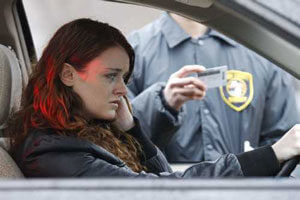 Suspended License
Suspended License
What is license suspension and revocation?
Suspension is having your license taken away for a period before it is returned to you. You may be required to pay a suspension termination fee to get it back. Revocation is more severe. It means that your license has been voided. Revocation terminates your license indefinitely or for a specified amount of time. Once the revocation period is over, you must re-apply to the Department of Motor Vehicles (DMV) to obtain a new license and pay a license re-application fee. Your application may be denied if you have a bad driving record or fail to meet other DMV requirements. New York State considers it a criminal misdemeanor offense, which means that if you are convicted of driving on a suspended license, you will have a criminal conviction. This will not go away. This will stay with you the rest of your life. It is important that you have an attorney at every stage of appearing in front of a judge on a suspended license.
Causes for a license suspension or revocation in New York
In the state of New York, your license can be suspended or revoked for a host of reasons. Some include the following:
- Accumulation of points: If your driving record accumulates 11 or more points within an 18-month period, you may face suspension by either the DMV or a judge.
- Failure to answer a traffic summons: When a traffic summons is given, failure to respond within the time limit can result in a revoked or suspended license.
- Failure to pay fines: If you refuse to pay mandatory fees, such as surcharges, suspension-termination fees or crime victim assistance program fees, your license may be suspended or revoked.
- Payment with a bad check: Submission of a bad check to the DMV is cause for suspension in New York.
- Driving while ability impaired by a drug (other than alcohol) (DWAI-Drug): This results in an automatic six-month license suspension.
- Driving while ability-impaired by alcohol (DWAI-Alcohol): This results in an automatic 90-day license suspension.
- Revocation is mandatory in the following situations:
- DWAI committed within five years of any previous DWAI: Six-month revocation
- Driving while intoxicated (DWI): Six-month revocation
- Three speeding violations committed within 18 months: Six-month revocation
- Leaving the scene of a fatal or personal injury accident: Six-month revocation
- Refusal to submit to a chemical test: One-year revocation
- Conviction for uninsured operation or permitting uninsured operation: One-year revocation
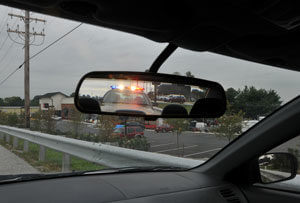 Leaving the Scene of an Accident
Leaving the Scene of an Accident
Leaving the scene of an accident where property damage occurred
New York code VTL 600(1) indicates that if a driver involved in an auto accident knows, or has reason to know, that property damage has occurred, the driver is required to stay at the scene of the accident to provide all the following:
- Driver license
- Proof of insurance
- Driver’s name and address, insurance carrier and driver license number to the other party
If you left the scene of an accident or have been ticketed for such, you can be fined up to $250 and face possible jail time of up to 15 days. In addition, at-fault drivers receive three points on their license.
If you are a commercial driver and leave the scene of an accident, you run the risk of having your license revoked for one year.
Leaving the scene of an accident where personal injury occurred
New York state law says that if a driver is involved in an accident and knows or has reason to know that personal injury to another has occurred, the driver must stop at the scene and provide license and insurance information. Failure to do so could result in your being charged with a felony or misdemeanor. Subsequent violations are considered a Class A misdemeanor, followed by a Class E felony.
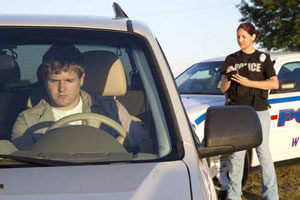 Driving Without Insurance
Driving Without Insurance
New York law requires that every vehicle driven on a public road must carry liability insurance. As the insured, you must be able to provide confirmation of coverage. If you fail to comply, you run the risk of being ticketed or arrested and your vehicle being impounded by the police. In addition, the Department of Motor Vehicles (DMV) may suspend your registration, requiring you to turn in your license plate.
New York auto insurance requirements
New York has very specific insurance laws regarding the operation of a vehicle. Insurance must be issued and company licensed by the New York State Department of Financial Services. The registration and insurance must be listed under both the same name and the same address. The minimum insurance requirements are as follows:
- $25,000 bodily liability maximum for one person injured in an accident
- $50,000 bodily injury liability maximum per incident
- $10,000 property damage liability maximum for one accident
Penalties for driving without insurance in NY
New York has established minimum insurance requirements to operate a vehicle. If you have failed to maintain insurance coverage on your vehicle, you can be subject to receive a citation from a police officer and the potential of financial loss if an accident has occurred. Driving without the minimum insurance in NY is a criminal offense carrying the following serious consequences:
- Citations
- Driver license suspension up to a maximum of three years
- Suspension of vehicle registration
- Excessive fines
Liability of drivers without insurance if they allow others to drive their uninsured vehicle
Letting someone borrow your vehicle is a common occurrence. However, know that if you do, you assume liability for that person. If you do not have the required insurance and the person is in an accident, you may be held liable.
New York law states that vehicle owners are liable whether they drive their vehicle or allow others to drive. The penalty is loss of your driver license for at least one year ― the same penalty if you were the one who had the accident while uninsured. In addition, you may need to pay in full many other fines, fees, and costs, often as high as $1,500, prior to applying for a new license.
Insurance Lapse Violations
If you are charged with an insurance lapse violation in New York State, the penalties can be quite severe. Not only do you face charges in a traffic or criminal court, there are additional penalties that DMV may impose for the insurance lapse. DMV typically will impose a fine of $8 a day for the first 30 days of an insurance lapse. Between 31 and 60 days, DMV will impose a fine of $10 a day for each day, and if your lapse goes between 61 and 90 days, DMV will impose a fine of $12 a day. In addition to that, your license could be suspended or revoked based on the period of the insurance lapse.
What Is the Difference Between Driving Without A License And Driving With A Suspended License?
In New York, driving without a license typically means that you’ve not been issued a license, and you are driving without one. Driving on a suspended license is a very different charge. That is a criminal traffic misdemeanor in New York State, and in most cases, your license has been suspended for failing to pay traffic fines or tickets in other localities.
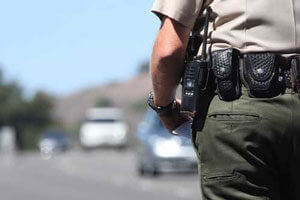 Reckless Driving
Reckless Driving
Reckless driving is an unclassified misdemeanor offense in New York State, and, if convicted, you can face the following:
- Up to five points on your driver license
- A possible increase in your auto insurance
- A criminal record
Penalties for reckless driving
Reckless driving is a serious charge that results in a criminal record if convicted. A conviction for reckless driving results in five points on your driving record, which significantly increases your insurance premiums. You may also receive fines of $100–$300, plus a fee of $70 for first-time offenders. In New York, your driving privileges may be suspended if you receive 11 points in an 18-month period.
Reckless driving is rather subjective and serves as a catch-all for many different driving infractions such as the following:
- Talking on a cell phone
- Texting while driving
- Using any mobile device
- Eating or drinking
Because reckless driving is considered a criminal offense, many district attorneys require a court appearance and do not allow you to handle the offense via mail. This makes fighting a charge of reckless driving even more challenging. Judges are generally less flexible when negotiating a criminal reckless driving case, which is why you need an aggressive defense lawyer to represent you.
What is a Criminal Record in New York
A criminal record is a record of a person’s criminal history. It includes all of the criminal offenses that a person has been convicted of, as well as any other interactions with law enforcement, such as arrests or charges. In New York, criminal records are maintained by the Division of Criminal Justice Services.
How do Traffic Tickets Impact Your Criminal Record?
Traffic tickets are considered non-criminal offenses in New York. They are classified as violations, and they do not result in a criminal record. However, there are some exceptions to this rule.
If you are convicted of certain traffic offenses, such as driving under the influence of drugs or alcohol, reckless driving, or leaving the scene of an accident, you could face criminal charges. These charges could result in a criminal record, which can have serious consequences.
A criminal record can impact many aspects of your life, including your ability to find employment, obtain housing, or secure loans. It can also affect your immigration status, and in some cases, result in deportation.
How to Minimize the Impact of Traffic Tickets on Your Criminal Record
If you receive a traffic ticket in New York, it is important to take it seriously. Even if the offense is minor, it is still a legal matter that requires your attention.
Here are some tips for minimizing the impact of traffic tickets on your criminal record:
Pay the fine and plead guilty if necessary. If you cannot contest the ticket, it is better to pay the fine and plead guilty rather than ignore the ticket. Ignoring a ticket can result in additional fines and penalties, and it could also result in a warrant for your arrest.
Hire an attorney. If you are facing criminal charges as a result of a traffic ticket, it is essential to hire an experienced attorney. An attorney can help you navigate the legal system, negotiate with prosecutors, and potentially reduce or dismiss the charges.
Attend traffic school. In some cases, attending a traffic school can help you reduce or eliminate the points on your license. This can help you avoid higher insurance rates and keep your license in good standing.
Maintain a clean driving record. One of the best ways to minimize the impact of traffic tickets on your criminal record is to maintain a clean driving record. This means driving responsibly, obeying traffic laws, and avoiding any additional traffic violations.
It is important to remember that every traffic violation is unique, and the consequences will vary based on the severity of the offense and your driving history. Therefore, it is essential to consult with an experienced attorney who can advise you on the best course of action based on your specific circumstances.
In addition to the impact on your criminal record, traffic tickets can also have other consequences, such as points on your driver’s license, higher insurance rates, and even the suspension or revocation of your driver’s license.
Points on your driver’s license are one of the most common consequences of traffic violations in New York. Each violation has a certain number of points assigned to it, and if you accumulate too many points within a certain period, your driver’s license could be suspended or revoked. Therefore, it is essential to take steps to minimize the points on your license, such as attending traffic school or negotiating with prosecutors to reduce the charges.
Traffic tickets can have serious consequences, including an impact on your criminal record in New York. If you receive a traffic ticket, it is important to take it seriously and take steps to minimize the impact on your record. By paying fines, hiring an attorney, attending traffic school, and maintaining a clean driving record, you can help protect your future and avoid potential legal consequences.
As a team at Arthur L. Pressman, Attorney at Law, we can help you with the impact of traffic tickets on your criminal record in New York cases. We provide legal representation, advice, and guidance to help you minimize the impact of traffic violations on your criminal record. Our experienced attorneys can help you navigate the legal system, negotiate with prosecutors, and build a strong defense to protect your rights and future. Additionally, we can provide you with guidance on attending traffic school, restoring your driver’s license, and fighting for your rights in court.
Understanding Red Light Camera Tickets
Red light camera tickets in New York are issued when a vehicle is photographed running a red light at an intersection equipped with a camera. These cameras are strategically placed at intersections with high incidences of traffic violations or accidents, making them a key component of the city’s traffic enforcement strategy. The camera system is designed to capture two images: one of the vehicle entering the intersection after the light has turned red, and another of the vehicle in the middle of the intersection. These images are then reviewed by law enforcement officials to determine if a violation has occurred.
One of the key differences between a red light camera ticket and a traditional traffic ticket is that red light camera violations are generally considered non-moving violations. This means that they do not result in points being added to your driving record. However, they do carry a monetary fine, which can be significant. The fine for a red light camera ticket in New York is typically around $50, though additional fees and penalties may apply if the ticket is not paid promptly.
There Is More Than One Way to Measure Speed.
New York State Troopers use two devices to measure vehicle speed: Stalker DSR units and LTI Ultralyte LR B devices. Stalker Directional Sensing Radar employs a ground-breaking technology that allows the radar unit to detect the speed of an approaching or withdrawing object while the unit is stationary or moving. The LTI Ultralyte LR B is a pinpoint laser device that sends out a beam of light and then reads the speed when the light bounces back from a moving object. The beam is only three feet wide at 1,000 feet of distance, allowing officers to validate the speed of a single vehicle, even in tight traffic. These are precise instruments that require little on the part of an operator to get an accurate reading.
The Police Do Not Even Need to Be Present to Issue Speeding Tickets in New York.
A variety of different methods and forms of technology are used to measure the speed of a vehicle. Some of the most common methods of determining the charge are with speed cameras and aerial speed devices. A speed radar camera is used to trigger a camera to photograph vehicles traveling faster than a set speed. This type of device also captures the specific time, location, and speed. Police in New York measure vehicle speeds using aircraft by monitoring the time that it takes a target to travel between two marked spots. The aerial speed devices then signal to ground officers, who issue the speeding violations.
There Are Hefty Fines—and Those Do Not Include Surcharges.
The maximum fine for driving less than 10 miles per hour above the speed limit is $150. Driving 11 to 30 mph above the limit doubles the potential fine, and driving 31 or more mph above the limit quadruples the fine; respectively, fines of up to $300 and $600 are possible. These fines are doubled in school zones during school hours. For each of these fines, there is a court surcharge of $80–85.
Yes, You Can Even Be Fined for Driving Below the Speed Limit.
New York State has a traffic law violation called “speed not reasonable and prudent,” which entails a speed that is within the limit but is nevertheless considered unsafe or not line with common sense—a nebulous criterion that still serves as the grounds for a ticket of $150, plus the $80–85 court surcharge. The same fine applies to driving too slowly, as traveling at a speed below that which is considered “normal and reasonable” and/or impeding traffic flow due to this lower speed both constitute a traffic violation.
There Is Always a Way to Challenge the Ticket.
After receiving speeding tickets from an officer who used a speed-measuring device, the accuracy of the reading can be questioned. Questions such as these can help to fight speeding tickets in New York:
– When was the last time that the speed-measuring device underwent maintenance?
– Was there “an even faster car” that passed you around the time that you were pulled over?
– Does your EZ-Pass record put you at a time and place that contradicts the speeding allegation?
– Did the officer correctly fill out the citation?
– Does your driving record give a judge cause to be lenient?
Consequences of a Ticket
Receiving a ticket for failing to stop at a stop sign can have various consequences. Firstly, there’s the financial aspect, as fines for traffic violations can be substantial. Additionally, points may be added to your driving record, which can lead to increased insurance premiums. Furthermore, accumulating too many points within a certain period can result in the suspension or revocation of your driver’s license.
Options for Handling the Ticket
If you receive a ticket for failing to stop at a stop sign in New York, you have several options for handling it. The first option is to plead guilty and pay the fine. However, this may not be the most favorable choice, as it will result in points on your driving record and potential insurance ramifications.
Alternatively, you can choose to contest the ticket. This involves pleading not guilty and appearing in court to present your case. It’s essential to prepare thoroughly for your court appearance, gathering any evidence or witnesses that support your defense. This could include photographic evidence, witness testimony, or documentation demonstrating extenuating circumstances.
Seeking Legal Representation
Navigating the legal system can be complex, especially when it comes to traffic violations. As such, many individuals opt to seek legal representation to assist them in handling their ticket. An experienced attorney can provide invaluable guidance throughout the process, advising you on your rights, potential defenses, and the best course of action to take.
Understanding Legal Procedures
When contesting a failure to stop at a stop sign ticket in New York, it’s crucial to understand the legal procedures involved. Upon receiving the ticket, you will typically have the option to plead guilty, not guilty, or no contest. Pleading guilty means accepting responsibility for the violation and agreeing to pay the associated fines. On the other hand, pleading not guilty indicates that you dispute the charges and wish to contest them in court. Opting for a no contest plea means you neither admit nor deny the charges but accept the consequences.
Preparing Your Defense
If you choose to contest the ticket, thorough preparation is key to mounting a successful defense. Start by reviewing the details of the incident, including the location, time, and circumstances surrounding the alleged violation. Collect any evidence that supports your case, such as photographs, witness statements, or dashcam footage. It’s also essential to familiarize yourself with relevant traffic laws and regulations to bolster your argument in court.
Attending the Hearing
Once you’ve gathered all necessary evidence and prepared your defense, you’ll need to appear in court for your scheduled hearing. Be sure to arrive early and dress appropriately, as first impressions can significantly impact the outcome of your case. During the hearing, you’ll have the opportunity to present your evidence, question witnesses, and argue your position before the judge. It’s essential to remain calm, respectful, and composed throughout the proceedings, regardless of any challenges or objections raised by the prosecution.
Potential Outcomes
The outcome of your hearing will depend on various factors, including the strength of your defense, the judge’s interpretation of the evidence, and any mitigating circumstances surrounding the incident. If the judge finds in your favor, the ticket may be dismissed, and you will not be required to pay any fines or face additional penalties. However, if you are found guilty, you may be ordered to pay fines, incur points on your driving record, or attend a defensive driving course, depending on the severity of the violation and your prior driving history.
Review the Ticket
Upon receiving the red light camera ticket, carefully review all the information provided. Check for accuracy in the date, time, location, and the alleged violation. Make sure the images or video evidence clearly show the violation and accurately identify your vehicle. Note that red light camera tickets are typically mailed to the vehicle’s registered owner, so if you were not the driver at the time of the incident, you might need to identify the actual driver in the appeal process.
Research the Violation
Before contesting the ticket, research the specific red light camera laws and regulations in New York. Familiarize yourself with the legal requirements and the potential penalties for this violation. This information will empower you with the necessary knowledge to build a solid defense for your case.
Gather Evidence
To strengthen your case, gather any evidence that supports your claim of innocence. This may include photographs or video footage that contradict the alleged violation, eyewitness statements, or any technical issues with the red light camera itself. If you believe the yellow light duration was too short, collect data to support this claim. Ensure you have all necessary documentation to present a compelling case.
Check the Red Light Camera Equipment
Make sure to verify the red light camera’s maintenance records and calibration certifications. In New York, red light cameras must meet specific standards, and the equipment’s accuracy is crucial to the validity of the ticket. If you discover any issues with the camera’s maintenance or calibration, this can be used as evidence to contest the ticket.
Draft a Formal Appeal
Prepare a formal appeal letter, addressing it to the appropriate authority responsible for handling red light camera tickets in New York. Be concise, factual, and respectful in your appeal. Clearly explain why you believe the ticket is unjust and present your evidence to support your case. Include any relevant documentation and a copy of the ticket, if necessary.
Submit Your Appeal
Submit your appeal and all supporting evidence by mail or through the specified online portal. Ensure that you keep a copy of everything you send for your records. Once your appeal is received, the authorities will review the case and make a decision.
Await the Decision
Be patient while waiting for the decision on your appeal. It may take several weeks for the authorities to review your case thoroughly. If your appeal is successful, the ticket will be dismissed, and you will not be required to pay the fine. If the appeal is denied, you may need to consider further legal options, such as requesting a hearing or consulting with an attorney.
Understanding the Impact of a Traffic Ticket in New York
A traffic ticket might seem like a minor inconvenience, but it can have serious implications. Depending on the violation, you could face fines, points on your driving record, increased insurance premiums, and even the suspension of your license. New York uses a point system to monitor drivers, and accumulating too many points within a specific period can lead to further penalties. These penalties can disrupt your life, affecting your ability to work, travel, and maintain your financial stability. That is why it is important to address a traffic ticket promptly and take the right steps to protect your driving record.
Assessing the Details of Your Ticket
The first step in addressing a traffic ticket is to carefully review the details provided. This includes the specific violation, the location where it occurred, and the date by which you must respond. Understanding what you are being accused of is essential, as it forms the basis of your defense. Some tickets might include errors or lack sufficient evidence, which could provide grounds for dismissal. However, uncovering these details requires a careful review and often an understanding of New York’s traffic laws.
Deciding How to Plead
When responding to a traffic ticket, you generally have three options: plead guilty, plead not guilty, or in some cases, plead no contest. Pleading guilty typically means paying the fine and accepting the penalties, which can include points on your license. Pleading not guilty, on the other hand, means you are contesting the violation and will have an opportunity to present your case in traffic court. Deciding how to plead is a critical step, and it often helps to seek legal advice to weigh the potential risks and benefits of each option.
Preparing for Your Traffic Court Hearing
If you choose to fight your traffic ticket, the process will involve a court hearing. This can feel intimidating, but preparation is key. In traffic court, you will have the opportunity to present evidence, question the officer who issued the ticket, and argue your case before a judge. Evidence might include photographs, witness statements, or proof that the violation was issued in error. The officer’s testimony and any documentation they provide will also play a significant role. The goal is to create reasonable doubt about the violation or demonstrate mitigating circumstances.
Common Defenses Against Traffic Violations
There are various defenses that can be used to challenge a traffic ticket in New York. These might include questioning the accuracy of radar or speed detection equipment, disputing the officer’s observations, or proving that road signs were unclear or obstructed. Some defenses focus on procedural errors, such as incorrect information on the ticket or failure to follow proper protocol when issuing the citation. Every case is unique, so building a strong defense often requires a detailed analysis of the specific circumstances surrounding the violation.
Understanding the Basics of New York Traffic Court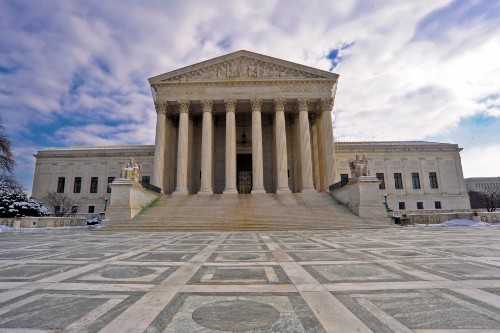
Traffic court in New York handles a myriad of traffic-related offenses, ranging from minor infractions to more serious violations. It’s essential to understand the basics of the court system to navigate the process effectively.
Before the Court Date
Upon receiving a traffic ticket, you’ll find important information on the ticket itself, including the court date and location. It’s crucial to note these details and begin preparations well in advance of the scheduled court appearance. Ignoring or delaying action may lead to additional penalties and consequences.
The Benefits of Legal Representation
Navigating the traffic court process alone can be daunting. Having legal representation can provide a significant advantage. An attorney with experience in traffic law will understand the nuances of the legal system and how to effectively challenge a ticket. They can handle negotiations with the prosecution, identify weaknesses in the case against you, and present a compelling argument in court. This not only increases your chances of a favorable outcome but also reduces the stress and uncertainty of handling the process on your own.
The Value of Protecting Your Driving Record
Fighting a traffic ticket is about more than avoiding a fine. It is about protecting your driving record and preventing long-term consequences. Points on your license can add up quickly, leading to higher insurance rates and even the suspension of your driving privileges. By challenging a ticket, you are taking proactive steps to safeguard your future and maintain your ability to drive without unnecessary complications.
Why Timing is Critical
Responding to a traffic ticket in a timely manner is crucial. Ignoring a ticket or missing a deadline can result in additional penalties, including a default judgment or license suspension. Acting quickly gives you the best chance to gather evidence, prepare your case, and explore all available options. It also demonstrates to the court that you take the matter seriously and are committed to resolving it responsibly.
How an Attorney Can Make a Difference
Traffic ticket cases require a combination of legal knowledge, attention to detail, and effective communication skills. An attorney can guide you through the entire process, from assessing the ticket to representing you in court. They can negotiate for reduced penalties or dismissal, depending on the circumstances of your case. Their familiarity with New York traffic laws and court procedures ensures that your case is handled efficiently and strategically, giving you peace of mind during what can be a stressful time.
Escalating Fines and Penalties
One of the first things you might experience if you ignore a traffic ticket in New York is an increase in fines. Traffic tickets usually come with a set fine amount. However, if you do not pay the fine or show up in court by the deadline provided, the cost can start to rise quickly. Late fees and additional penalties can be added on top of the original amount. In some cases, the fines can double or even triple the original ticket’s cost. This can make what started as a minor traffic violation much more expensive.
Along with increased fines, ignoring a traffic ticket can also result in other financial penalties. For example, New York has a Driver Responsibility Assessment program that applies to drivers who accumulate six or more points on their driving record within 18 months. If you ignore your ticket and are found guilty of the violation, the points will go on your record, potentially pushing you into the range where you will owe an additional yearly fee. This program requires you to pay the state of New York an extra charge for three years. Ignoring the ticket can make these costs unavoidable.
License Suspension
Another significant consequence of ignoring a traffic ticket in New York is the possibility of having your driver’s license suspended. If you fail to respond to a traffic ticket, the New York Department of Motor Vehicles (DMV) can suspend your license. This can happen if you do not pay the fine, do not appear in court, or do not answer the ticket in the time frame required. The DMV will send a notice to inform you that your license is suspended, but if you miss this notice or ignore it as well, you could be driving on a suspended license without even realizing it.
What to do if you get pulled over for a traffic violation in New York
Getting pulled over for a traffic violation in New York can be a stressful experience, but knowing what to do can help you stay calm and handle the situation appropriately. In this blog post, we will provide you with a step-by-step guide on what to do if you get pulled over for a traffic violation in New York.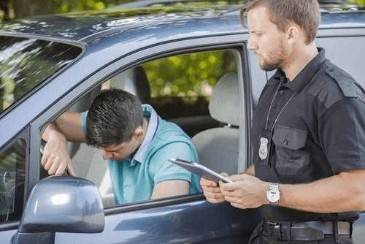
Step 1: Pull over safely
When you see the police car with the flashing lights in your rearview mirror, the first thing to do is to pull over to a safe location as quickly as possible. Choose a location that is safe for both you and the police officer, such as the shoulder of the road or a nearby parking lot. Turn off your engine and wait for the officer to approach your vehicle.
Step 2: Stay calm and respectful
When the officer approaches your vehicle, stay calm and respectful. Keep your hands visible on the steering wheel and wait for the officer to speak to you. Answer the officer’s questions politely and respectfully, and avoid making any sudden movements.
Step 3: Provide your documents
When asked, provide the officer with your driver’s license, vehicle registration, and proof of insurance. Make sure to keep these documents easily accessible and organized so that you can quickly provide them to the officer.
Step 4: Follow the instructions
The officer may ask you to step out of your vehicle for further questioning or a field sobriety test. Follow the officer’s instructions, but remember that you have the right to remain silent and the right to refuse a field sobriety test. Be aware that refusing a field sobriety test may result in the suspension of your driver’s license.
Step 5: Receive your ticket
If the officer decides to issue you a traffic ticket, make sure to review it carefully and understand the charges against you. You have the option to plead guilty or not guilty to the charges. If you plead guilty, you can pay the fine online, by mail, or in person. If you plead not guilty, you will have to appear in court to contest the charges.
Step 6: Drive safely
After receiving your ticket, make sure to drive safely and follow all traffic laws. Avoid getting pulled over again, as multiple traffic violations can result in the suspension of your driver’s license.
Getting pulled over for a traffic violation in New York can be a nerve-wracking experience, but following these steps can help you handle the situation calmly and appropriately. Remember to pull over safely, stay calm and respectful, provide your documents, follow instructions, review your ticket carefully, and drive safely. By doing so, you can avoid further complications and ensure a smooth resolution of the situation.
How can you avoid accumulating points on your license?
The best way to avoid accumulating points on your license is to drive safely and follow the rules of the road. Here are some tips:
- Observe the speed limit: Speeding is one of the most common traffic violations. Make sure you stay within the posted speed limit, especially in school zones or residential areas.
- Stop at red lights and stop signs: Failing to stop at a red light or stop sign is not only dangerous but also comes with a hefty penalty. Make sure you come to a complete stop before proceeding.
- Use your turn signals: Using your turn signals is not only courteous but also a legal requirement. Make sure you use them before changing lanes or making a turn.
- Avoid distracted driving: Distracted driving is a leading cause of accidents. Avoid texting, eating, or doing anything else that takes your attention away from the road.
- Take a defensive driving course: Completing a defensive driving course can reduce your point total by up to four points. It’s also a great way to improve your driving skills and stay safe on the road.
What happens if you accumulate points on your license?
If you accumulate points on your license, there are several consequences that you may face. As mentioned earlier, accumulating 11 or more points within an 18-month period will result in a license suspension. The length of the suspension will depend on the number of points you have accumulated and whether you have any prior violations.
In addition to a license suspension, you may also be required to pay fines or fees. For example, if you accumulate 6 or more points within an 18-month period, you will be required to pay a driver responsibility assessment fee of $100 per year for three years.
If you accumulate points on your license, you may also see an increase in your car insurance rates. Insurance companies typically view drivers with points on their license as high-risk and may raise their rates accordingly.
How can you reduce the number of points on your license?
If you have accumulated points on your license, there are several ways to reduce the number of points. One option is to take a defensive driving course. Completing a course can reduce your point total by up to four points, and it may also help you become a safer driver.
Another option is to contest the violation in court. If you believe that the violation was issued in error or that you were not at fault, you can plead not guilty and request a hearing. If you win the hearing, the violation will be dismissed, and you will not receive any points on your license.
The New York point system is an important tool for promoting safe driving and penalizing those who violate traffic laws. By following the tips outlined in this blog post, you can avoid accumulating points on your license and stay safe on the road. However, if you do receive a violation, it’s important to take it seriously and take steps to reduce the number of points on your license. Remember, safe driving is not only important for your own well-being but also for the well-being of everyone on the road.
How Court Procedures Can Affect Your Case
Understanding the procedures of traffic court can significantly influence the outcome of your case. Each court has its own rules and practices, and knowing how to navigate them can be challenging without proper guidance. From filing the appropriate paperwork to meeting deadlines and following courtroom etiquette, every step plays a role in how your case proceeds. If you miss a deadline or fail to present your argument correctly, you could lose your chance to contest the ticket. Legal representation ensures that these procedures are followed correctly, reducing the risk of errors that could negatively impact your case. An attorney will know when and how to file motions, request evidence, and advocate on your behalf during the hearing. This thorough understanding of courtroom procedures can make a significant difference in the final decision.
What Happens If You Lose Your Case
Even with a strong defense, there is always a chance that the court will rule against you. If that happens, there are still options available. Depending on the specifics of your case, you may have the opportunity to appeal the court’s decision. The appeals process involves asking a higher court to review the ruling, and it requires a solid argument that a mistake was made in the original hearing. While an appeal is not always granted, it provides another chance to challenge the ticket. If an appeal is not possible, you may still be able to negotiate a reduction in fines or other penalties. Having legal support during this phase can provide clarity on your next steps and help you make informed decisions about how to proceed.
Take Control of Your Case Today
If you have received a traffic ticket in New York, do not face it alone. At Arthur L. Pressman, Attorney at Law, we are here to help you navigate the legal process and work toward a successful outcome. We understand how important it is to protect your driving record and your future, and we are committed to providing the guidance and support you need. Contact us today to discuss your case and learn how we can assist you in fighting your traffic ticket. Your future deserves the best possible defense.
Your Attorney should aggressively fight to:
- Reduce or eliminate the points on your driver license
- Protect your driver license
- Avoid jail time, fines and court costs
- Completely dismiss the charges
If you have been given a traffic ticket and are ready to fight it, contact Arthur Pressman, an experienced Traffic Violations Attorney in Buffalo NY.



